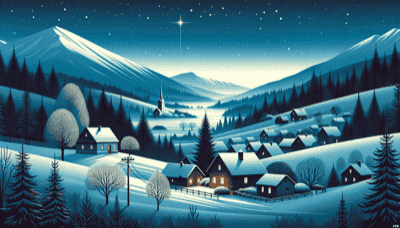We're here to help you keep count of the days to or since a date. Just click the button below and enter your chosen date to get started. Also choose the suggested days or search for a special day above #countingthedays

The December Solstice, also known as the Winter Solstice in the Northern Hemisphere, marks the shortest day and longest night of the year. In Czechia, this astronomical event usually occurs on December 21st or 22nd. On this day, the Sun reaches its lowest daily maximum elevation in the sky.
Historically, the solstice has been associated with a variety of pagan celebrations. In Czech traditions, this time was seen as a period when the forces of darkness were at their strongest, but also as the turning point towards light as days start to grow longer after the solstice.
One of Czechia's ancient customs is "Koledování," a form of Christmas caroling which is linked to pre-Christian winter solstice rituals. Often young men dressed in costumes would go around their village singing songs and performing plays to drive away evil spirits and bring good luck for the coming year. Although its popularity has waned, some villages still maintain this tradition.
Another tradition is related to agriculture – farmers believed that from December Solstice onwards, the sun had enough power to start warming up the earth again and preparing it for sowing crops.
Today, most Czechs do not celebrate the solstice with specific rituals. Instead, preparations for Christmas are well underway during this time as it falls just a few days before Christmas Eve (known as "Štědrý den" in Czech).
People are often busy with holiday preparations including buying gifts, decorating their homes with Christmas ornaments and lights, baking traditional sweets like "vánočka" (a braided bread), and attending holiday markets or cultural events.
While some people may take note of the astronomical significance or enjoy activities such as watching sunrise or sunset on this shortest day of the year, for many it's a regular workday albeit with an awareness that it signifies a shift towards longer days ahead.